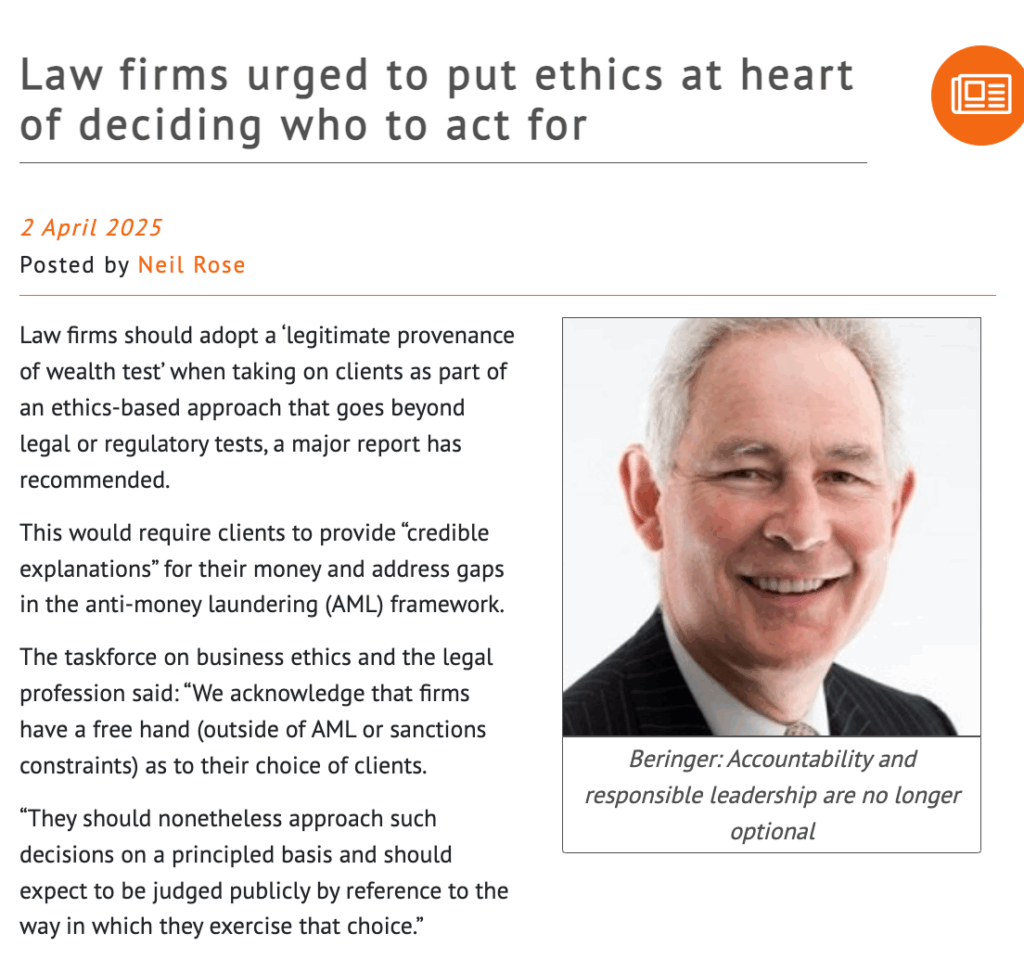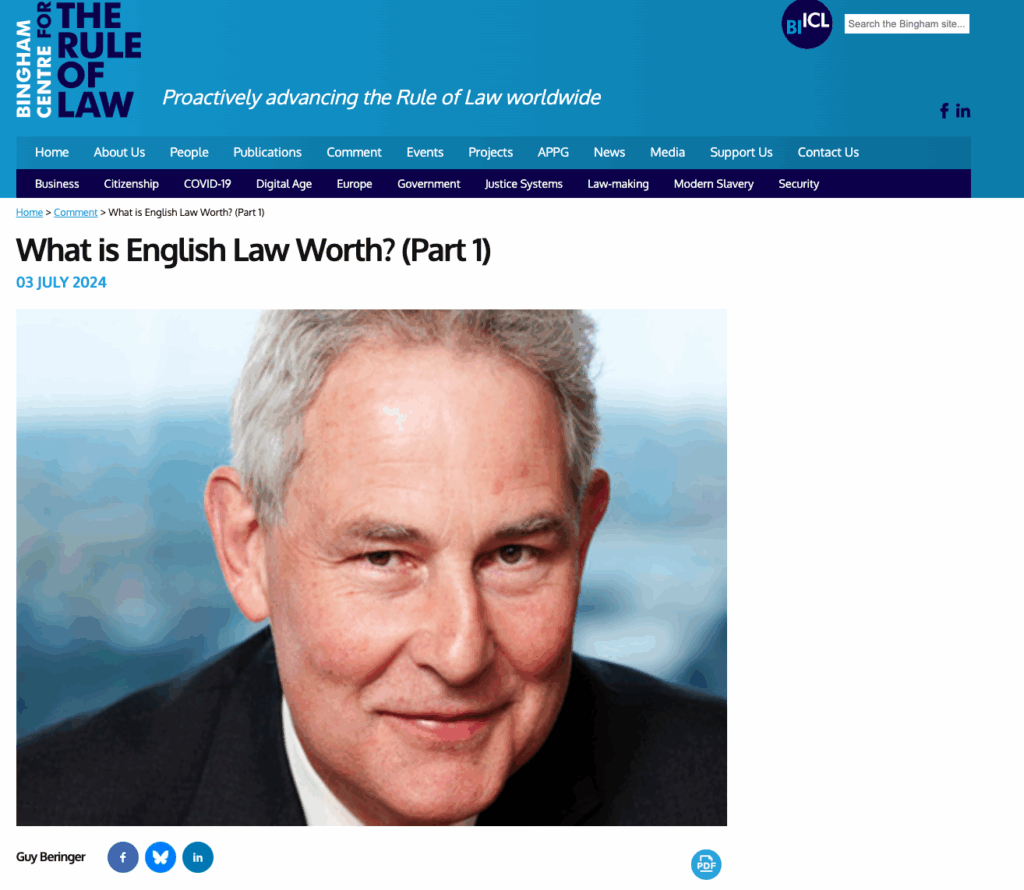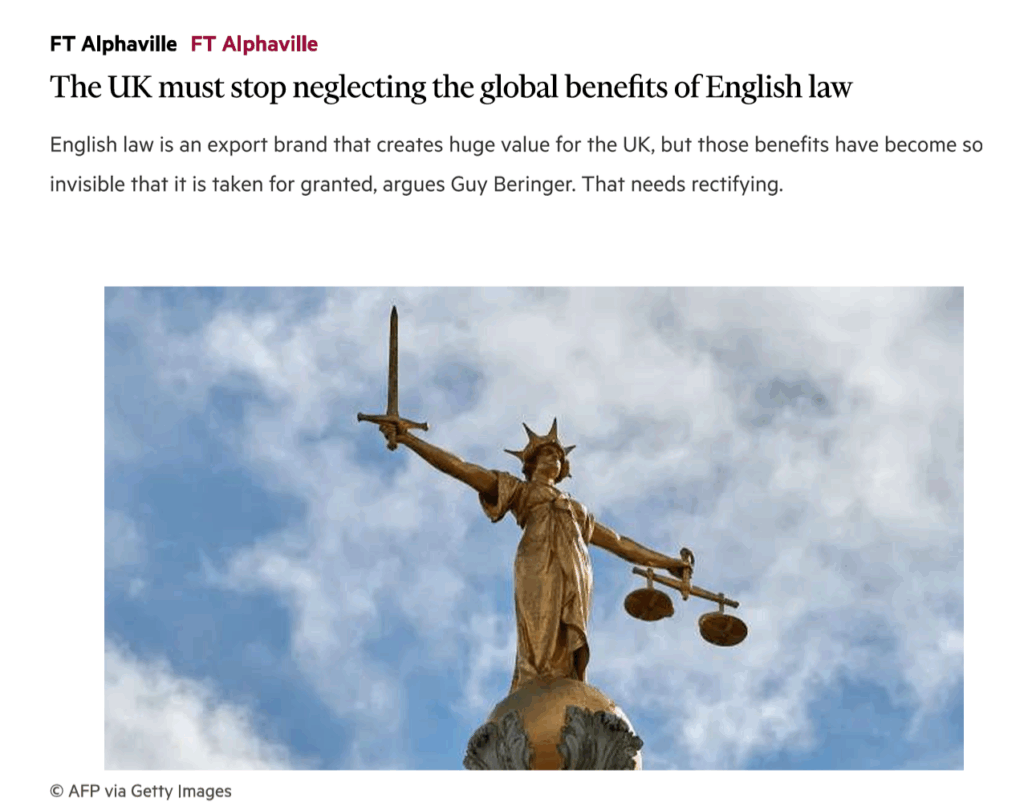A selection of features, reviews and media mentions across national publications and platforms.
From commentary on legal ethics and governance to reviews of Tales from Port Navas Creek, these articles reflect how Guy’s work has engaged with a wider public conversation — spanning law, leadership, and storytelling.
Law firms urged to put ethics at heart of deciding who to act for.
The taskforce’s recommendations do not aim to dismantle traditions; they mean to strengthen them. As lawyers, we must adapt to a rapidly changing world while upholding our long-standing responsibilities to society.
“Trust, accountability and responsible leadership are no longer optional. They must be placed at the heart of the profession if we wish to restore public trust and ensure a continuation of service. This report lays out a roadmap for change.”
LegalFutures
Stewarts are first adopters of IBE ethical decision principles for responsible business intake.
“Stewarts hosts the launch event for the report of the Taskforce setting out recommendations and a framework for England and Wales-based law firms to reduce the risk of facilitating kleptocracy, state capture and grand corruption. Stewarts endorses the IBE Taskforce on Business Ethics and the Legal Profession’s framework, solidifying the firm’s commitment to ethical client onboarding.”
Stewarts
What is English Law worth?
“It does not take long to work out that driving economic growth whilst ignoring the financial cost-shunting of a threadbare civil justice system is the financial equivalent of pedalling faster with a slow puncture. The law is the plumbing of our economy. If it is in disrepair, it costs us significant amounts of money in cost-shunting. The fact that no-one is able (or apparently inclined) to calculate exactly the scale of that cost appears to be an excuse for simply ignoring it altogether. That is not economically sound. Yet it is the course taken for the past 25 years.”
Bingham Centre
Taskforce to examine ethics of firms acting for oligarchs.
“There are increasing examples of oligarchs using or looking to use our courts and UK-based firms for their civil proceedings and commercial transactions.
‘This means practitioners are walking a tightrope between professional obligations to provide representation and commercial considerations on one side, and the ethics of representing such individuals and what that means for public perceptions of their firms on the other.”
Law Gazette
Civil Legal Aid - a new approach
“The effective provision of social welfare legal help and representation requires a properly resourced set of organisations capable of delivering such help and representation where and when it is needed.
Civil legal aid is driven by complex eligibility and procurement rules which produce unsustainable economic friction costs for any organisation which tries to deliver help and representation to the public.
This has caused the provider base to shrink. There is no plan for rebuilding the provider base. Without a provider base, there will be no delivery of help and representation to those who need it.”
Hosted by
Joshua Rozenberg
“The legal profession has an important role in designing a future where the City prioritises rule of law over easy money and where sanctions can become a powerful economic deterrent. This may involve offering people, knowhow and expertise to the enforcement agencies. If the state is inept in enforcing the unexplained wealth regime, it is in the City’s interest that resources are offered by the private sector to enable the state to perform properly. Achieving equality of arms by making both sides inept is not a solution for a market place founded on the rule of law.”
City AM
“The economic value of the rule of law is more complex than the first two measures. It is a distillation of them into a framework akin to natural laws. It does not tell us what system of law and social conduct to adopt but it does tell us which structures will remain standing over time and which will inevitably fall over. In a world that seeks sustainability in all facets of existence, it is a unique tool. It has a distinctive value to the UK economy because it has become a part of the brand proposition for English law.”
City AM
The UK must stop neglecting the global benefits of English law
“English law is an asset of enormous value. It underpins the UK’s place at the heart of a number of global markets, among them those for derivatives, commodities, energy and trade finance. English law is selected because it is trusted to deal with complex outcomes in a fair manner; this trust is taken for granted. In so doing, it provides a legal safety net for trillions of dollars of transactions annually. Its status offers the opportunity for growth as new markets unfold.”
Financial Times
Legal platforms as economic tools
“One simple explanation may be that English law is an asset but it lacks an owner. It may be the most important single economic asset of the UK but it is an orphan in economic terms. It is freely available to all and is supported and curated by the judiciary and the justice system. But nobody derives rents from it and nobody controls its development.”
Spotlight
Legal platforms as economic tools
“Guy Beringer, former head of Allen & Overy, has been trying to get companies properly to engage with the concept of the law for several years now.
He hopes companies will join in the Bingham Centre’s efforts to main the primacy of English law across the globe, way beyond Brexit, combating the efforts in Asia and other places to supersede it. In effect he wants a risk register of Rule of Law issues. He says there are four core principles: certainty, where business knows from the outset what applies to them; fairness, where the law applies to everyone; enforceability, where there is redress in the courts if the law is broken; and a level playing field, where there is no bias in favour of one group over another.”
The Standard
BAILII needs your support
“There is one substantial and reliable source of case law which is entirely free of charge to all who use it. It is BAILII, the British and Irish Legal Information Institute, a charity whose supporters are largely in or connected to the legal profession. BAILII is an essential part of our rule of law fabric.”
The Law Society Gazette










